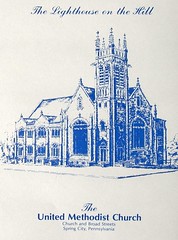God's Grace is Sufficient
October 25, 2009
Twenty-first Sunday after Pentecost
God’s Grace is Sufficient
Mark 10:46-52 and Hebrews 7:23-28
Lectionary texts from Job
Christ is able for all time to save those who approach God through him,
since he always lives to make intercession for them. – Hebrews 7:25
God’s grace is sufficient for me. – 2 Corinthians 12:9
My sermon outline:
• 3 scripture stories today, one of the faith healing of Bartimeus (Mark 10:46-52), one describing the perfect goodness of Jesus Christ’s self-sacrifice (Hebrews 7:23-28), and a resolution of sorts to the events of the book of Job.
Perhaps it’s not evident, but in each of these readings we get a pair of snapshots:
a picture of the world through human eyes,
and a picture of the world through God’s eyes.
• Bartimeus: human eyes: there’s an unhappy crowd, there’s unwellness. Blindman shutup!
God’s eyes: there’s faith (even Bart’s!) and healing and cause to sing I once was blind...
• Hebrews: human eyes: death, insufficiency of priesthood, continual atonement, weakness
God’s eyes: Christ, life everlasting, perfect sacrifice, once and done.
• Job: well, let’s talk more about Job.
• At the heart of the book of Job is the question “Why?” On one level it’s an individual’s question for personal suffering, but it can be taken to other levels as communities and nations wonder Why... where is God in this situation, how can God allow this to happen? Israel in exile. Jews in holocaust. Economic crisis. Abuse, addiction, murder. Where is God in this situation?
• In the storyline, Job’s friends offer unsatisfactory answers: more concerned with theology (and poor theology at that) than with the genuine suffering of their friend.
And Job, forever remembered as “patient”, loses patience pretty quickly and digs into something like a pitying self-righteous mode, more interested in defending his own character than seeking to understand or inquire of the character of God.
• God’s answer: Really? You think you have a clue about the nature of God?
• Story of Corrie ten Boom and her father (from the book The Hiding Place)... I would be a poor father if I made you carry that burden when you’re not big enough... trust me to carry it for you until you’re ready. (p. 27)
• Says God to Job: trust me with that knowledge until the fullness of time has come, and you’re ready. And in the end, I daresay by the grace and power of the Holy Spirit, Job does trust, does humble himself before God and repent.
• What’s this mean? Why? God allows hurts to happen (not necessarily WANTS or CAUSES hurts to happen) and then God introduces and injects: possibility, hope, reconciliation. God will use a hurt if we let him.
God will...
...use an addiction or abuse survivor to meet folks where they are, and be incarnation.
...use a senseless act of violence to build relationship (child bee-sting, draw unto me) and witness
...use economic crisis to demonstrate that faith and trust in God are not dependent on circumstances.
• So, response to the events of LIFE, why does God allow, not interfere with atrocities like holocaust or murder suicide, etc...
I trust that within the answer is God’s grace is sufficient, (like young Corrie ten Boom, I’ma let God carry that case), God’s ability far exceeds my own comprehension or lack thereof, and I’ma do what I can do: witness, live for God, study and put into action, trust and obey.
• Hymn 467 Trust and Obey
- Pastor Kerry
This Sunday: 66 in worship.

